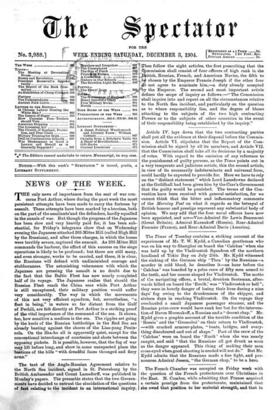T HE only news of importance from the seat of war
con- cerns Port Arthur, where during the past week the most persistent attempts have been made to carry the fortress by assault. These attempts have been marked by a heroism, both on the part of the assailants'and the defenders, hardly equalled in the annals of war. But though the progress of the Japanese has been slow and very heavily paid for, it has been sub- stantial, for Friday's telegrams show that on Wednesday evening the Japanese attacked 203-Metre Hill (called High Hill by the Russians), and after three charges, in which the losses were terribly severe, captured the summit. As 203-Metre Hill commands the harbour, the effect of this success on the siege operations is likely to be profound; but there are still many, and even stronger, works to be carried, and these, it is clear, the Russians will defend with undiminished courage and stubbornness. The astonishing vehemence with which the Japanese are pressing the assault is no doubt due to the fact that the Baltic Fleet has now nearly completed half of its voyage. The Japanese realise that should the Russian Fleet reach the China seas while Port Arthur is still uncaptured, their military position would suffer very considerably. The way in which the movements of this not very efficient squadron, but, nevertheless, "a fleet in being," in waters so far distant from the Gulf of Pechili, are felt directly at Port Arthur is a striking proof of the vital importance of the command of the sea. It shows, too, how sensitive a medium is the sea. The ripples set going by the keels of the Russian battleships in the Red Sea are already beating against the shores of the Liao-yang Penin- sula. On the Sha-ho all is apparently quiet, except for the conventional interchange of courtesies and shots between the opposing pickets. It is possible, however, that the fog of war may lift before long, and show in some unexpected place the bastions of the hills "with dreadful faces thronged and fiery arms."
The text of the Anglo-Russian Agreement relative to the North Sea incident, signed in St. Petersburg by the British Ambassador and Count Lamsdorff, was published in Monday's papers. The preamble states that the two Govern- ments have decided to entrust the elucidation of the questions of fact relating to the incident to an international inquiry.






































































 Previous page
Previous page